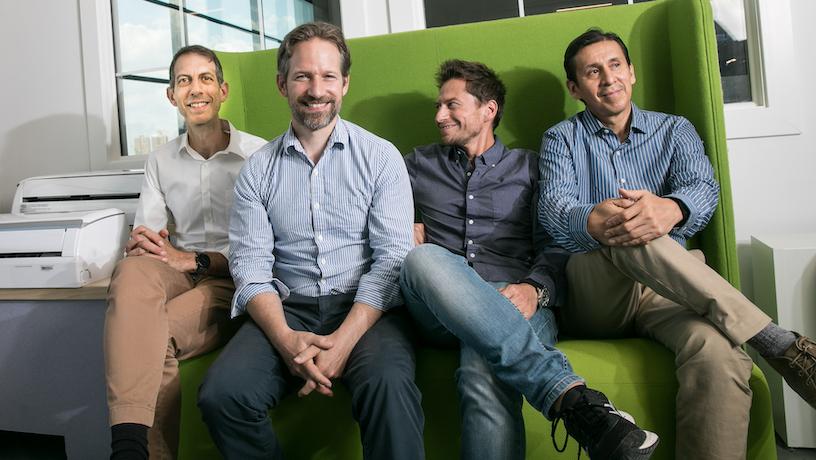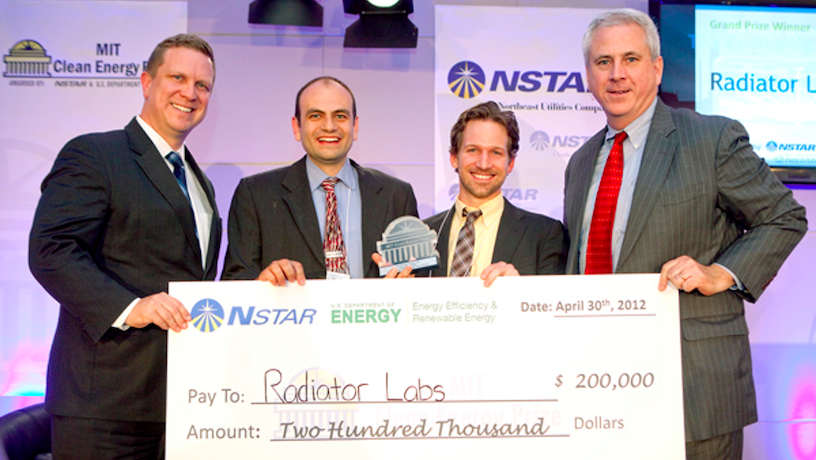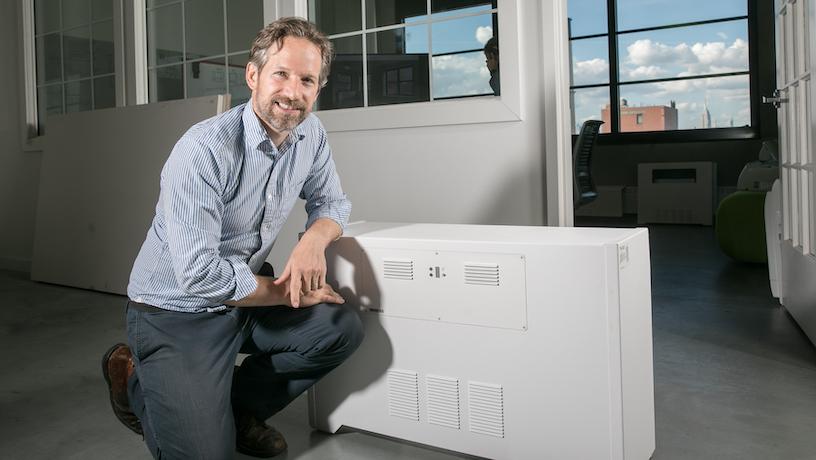Warming Trend
Eleven years after its founding in Columbia dorms by Marshall Cox PhD’13, Intelligent HVAC company Kelvin is ready to make resource-efficient decarbonization available to all.

Credit: Timothy Lee/Columbia Engineering
Kelvin is looking ahead.
In June, intelligent HVAC company Kelvin closed $30 million in Series A funding, led by climate and environment focused venture capital firm 2150 as well as contributions from the Schmidt Family Foundation and the Partnership Fund for New York City. The startup company, which launched as Radiator Labs, announced that going forward, it would be known as Kelvin. The company name change is a nod to new products that grow its mandate from radiator covers into heat pumps and thermal batteries that will not only let users enjoy even, controllable temperature in their units year-round, but will let buildings meet or exceed emissions caps while saving them money.
“The name Radiator Labs constrained expectations,” said Marshall Cox, founder and 2013 Columbia Engineering alumnus. “Now that the company is expanding beyond radiators, the name is more reflective of what we can do.”
Setting up the startup as a student

Taken in 2012, John Kymissis (center left) with Marshall Cox (center right), after winning the grand prize in the MIT Clean Energy startup competition. Credit: John Kymissis
Designing decarbonizing solutions wasn’t why Cox enrolled at Columbia Engineering. (That would be organic electronics.) But Kelvin’s roots at the school are deep. As a student, Cox spent his first three years at Columbia throwing open the window to cool a stiflingly hot, boiler-heated dorm room, even in the deep winter. It’s an experience all too resonant for most residents of New York City, where more than 75% of buildings rely on steam radiators.
The inefficiency, to say nothing of the discomfort, kept Cox awake at night — and inspired him by day to try and solve it. And even though it was outside of his field of research, he said, people like John Kymissis, the Kenneth Brayer Professor of Electrical Engineering, helped nurture and develop Kelvin’s signature product: the Cozy, an aftermarket insulated cover that snaps onto bulky radiator units to trap the heat emitted and release it into the room when necessary to maintain a consistent, preset temperature.
“[John] is very entrepreneurial – he’s great at every facet required of a hardware entrepreneur — but even though his lab does systems and advanced electronics, things like [this project] are still cool to him,” Cox said. Kymissis’ experience with applying for grants and looking for funding was equally critical, he said — and helped the company not only launch but stay in business.
“There was a lot of entrepreneurship in New York City, an accelerator environment, and Columbia was in the middle of that — Columbia Technology Ventures in particular,” Cox said. “We had a lot of help connecting with people we needed to connect to.”
Cozying up to the idea of growth and expansion

Credit: Timothy Lee/Columbia Engineering
Since their 2012 debut, more than 15,000 Cozy units have been installed in buildings across New York City and the northeastern United States. Cozys are built to spec for each building’s needs, and can accommodate not only the cast iron dorm radiators that inspired the project but wall mount boxes, baseboard heat units, and recessed convectors. And while the units have been primarily installed in residential buildings in New York City, Cozys are also operating in Class B and Class C commercial spaces, buildings belonging to the New York school system and a New York Police Department precinct, as well as space belonging to the Providence, RI Housing Authority.
While the units are a major upgrade for tenants, keeping rooms evenly (and comfortably) heated, the overall efficiency of the Cozy is a big win for buildings, too: According to the company, installing the units throughout a building can lower heating costs by as much as 45%.
Kelvin is so positive that installing the units can lead to savings through reduced costs and utility rebate and tax credit eligibility, in fact, that it offers a no-upfront cost subscription model that lets buildings install the units for a monthly fee (one lower than the calculated savings). It’s a model that makes the system particularly accessible to lower-income housing projects and other buildings that are often “shut out from energy efficiency savings,” Cox said.
“There are two big focuses for buildings considering installing the system: Trust in the product and the savings, and having access to the money to do the project,” he said. “And we have a response to both of them with the subscription model. It removes those barriers.”
Committed to decarbonization goals today and beyond
Kelvin’s newest innovations are poised to take the company even further toward its goal of resource-efficient decarbonization. A new system that pairs a heat pump with a thermal battery can replace A/C units to provide consistent, year-round climate control that Cox calls Hybrid Electrification. The system, which Kelvin will be demonstrating this fall ahead of a fall 2024 commercial rollout, can work independently of the Cozy, but when used together, can give a building 80% of the decarbonization effect of transitioning fossil-fuel burning boilers to electric power for just 10% of the cost.
Cox said installing both the Cozy and the hybrid electrification system can bring many buildings to below their greenhouse gas emissions cap levels for 2040 — today.
The new funding round comes at an essential time, Cox said, allowing Kelvin to “hire the people we’ve needed for the last five years” and fuel the launch of the hybrid electrification technology. To be at this point, he said, is a reflection of the culture of innovation and entrepreneurship that Columbia fostered, as well as the support of people like faculty advisor Kymissis.
“Sometimes I can't believe that an idea we came up with so long ago is really taking off. I've been very impressed with the support we have had from many sectors — getting this going has really been a team effort. Most of all, though, Marshall should be credited with seeing this through for the past decade-plus,” Kymissis said.
“There’s a lot of people in the Columbia Engineering and entrepreneurial community who have believed in us over many years,” Cox said. “Getting funding 11 years after founding is uncommon — it’s a testament to the support network at Columbia.”
